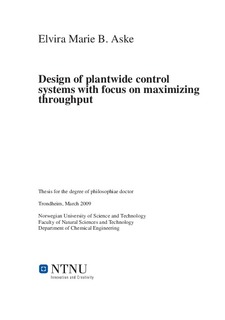Design of plantwide control systems with focus on maximizing throughput
Doctoral thesis
Permanent lenke
http://hdl.handle.net/11250/248124Utgivelsesdato
2009Metadata
Vis full innførselSamlinger
Sammendrag
This thesis discusses plantwide control configuration with focus on maximizing throughput. The most important plantwide control issue is to maintain the mass balances in the plant. The inventory control system must be consistent, which means that the mass balances are satisfied. Self-consistency is usually required, meaning that the steady-state balances are maintained with the local inventory loops only. We propose the self-consistency rule to evaluate consistency of an inventory control system.
In many cases, economic optimal operation is the same as maximum plant throughput, which corresponds to maximum flow through the bottleneck(s). This insight may greatly simplify implementation of optimal operation, without the need for dynamic optimization based on a detailed model of the entire plant.
Throughput maximization requires tight bottleneck control. In the simplest case when the bottleneck is fixed to one unit, maximum throughput can be realized with single-loop control. The throughput manipulator should then be located at the bottleneck unit. This gives a short effective delay in the control loop. Effective delay determines the necessary back off from constraints to ensure feasible operation. Back off implies a reduction in throughput and an unrecoverable economic loss and should therefore be minimized. We obtain a rough estimate of the necessary back off based on controllability analysis.
In some cases it is not desirable to locate the throughput manipulator at the bottleneck. To reduce the effective time delay in the control loop from the throughput manipulator to the bottleneck unit, dynamic degrees of freedom, like most inventories, can be used to reduce the effective time delay.
In larger plants there may be several independent feeds, crossovers and splits that should all be utilized to obtain maximum throughput. The proposed coordinator MPC both identifies the bottlenecks and implements the optimal policy. A key idea in the coordinator MPC is to decompose the plantwide control problem by estimating the remaining capacity for each unit using models and constraint in the local MPC applications. The coordinator MPC is demonstrated by dynamic simulation and by implementation on a large-scale gas processing plant.
